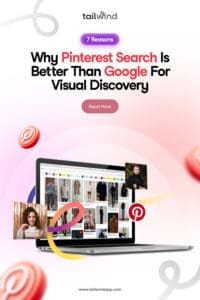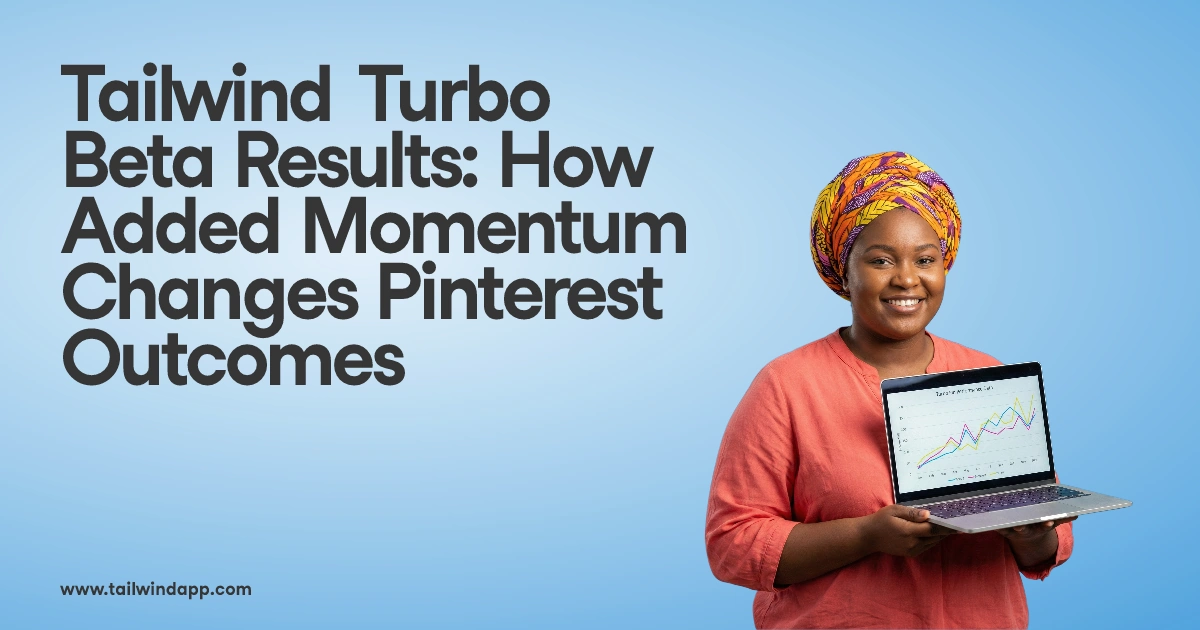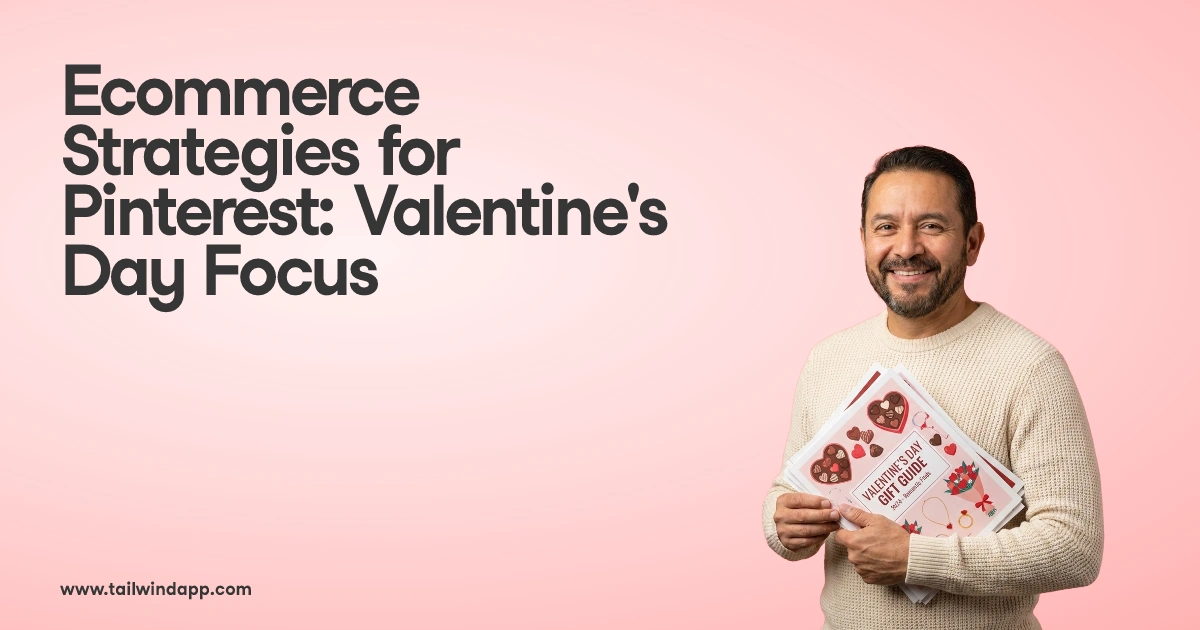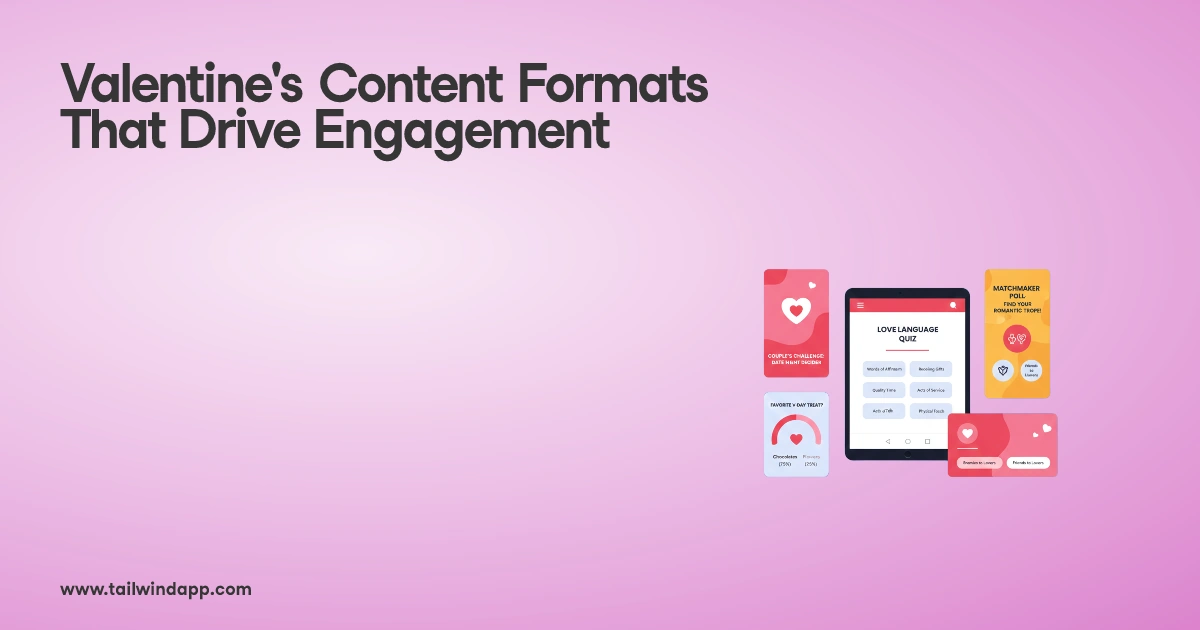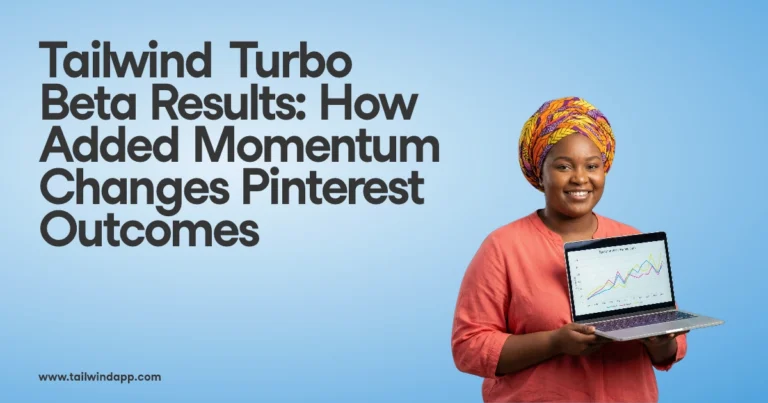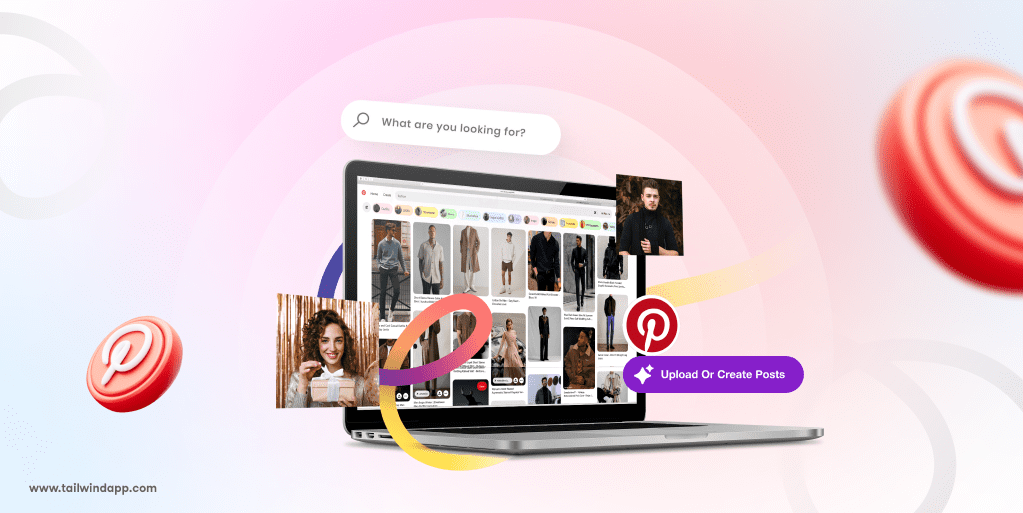
How many times have you tried to search for something visual on Google only to find yourself scrolling through pages of text-heavy results?
Whether you’re looking for kitchen renovation ideas, wedding inspiration, or outfit concepts, traditional search engines often fall short when it comes to visual discovery.
Enter Pinterest, a platform that has revolutionized the way we search for visual inspiration. While Google remains the undisputed king of information retrieval, Pinterest has carved out a unique space as the premier visual discovery engine.
At Tailwind we’ve helped thousands of businesses with their marketing, and we’ve discovered that Pinterest offers distinct advantages over Google in specific search scenarios. Let’s explore seven compelling reasons why Pinterest search outperforms Google search when it comes to visual discovery.
Reason #1: Visual-First Discovery Experience
The Power of Image-Based Search
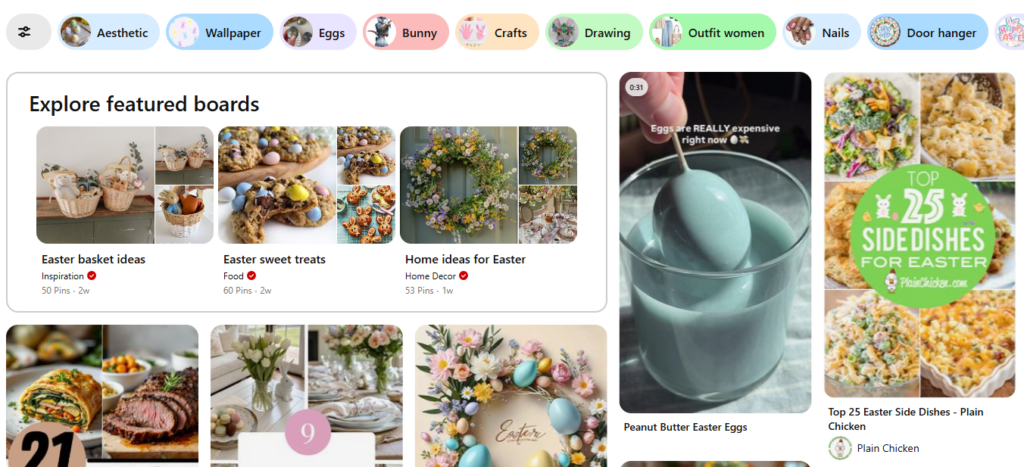
The fundamental difference between Pinterest Search and Google Search lies in their core architecture. Google was built to organize the world’s information primarily in text form. Pinterest, however, was designed from the ground up as a visual discovery platform.
When you search on Pinterest, you’re immediately presented with a grid of relevant images. This visual-first approach allows users to process and evaluate dozens of potential matches simultaneously, making it significantly more efficient for visual tasks.For example, a search for “bedroom ideas” on Google returns text-based results and a link to a Pinterest profile. 🙂
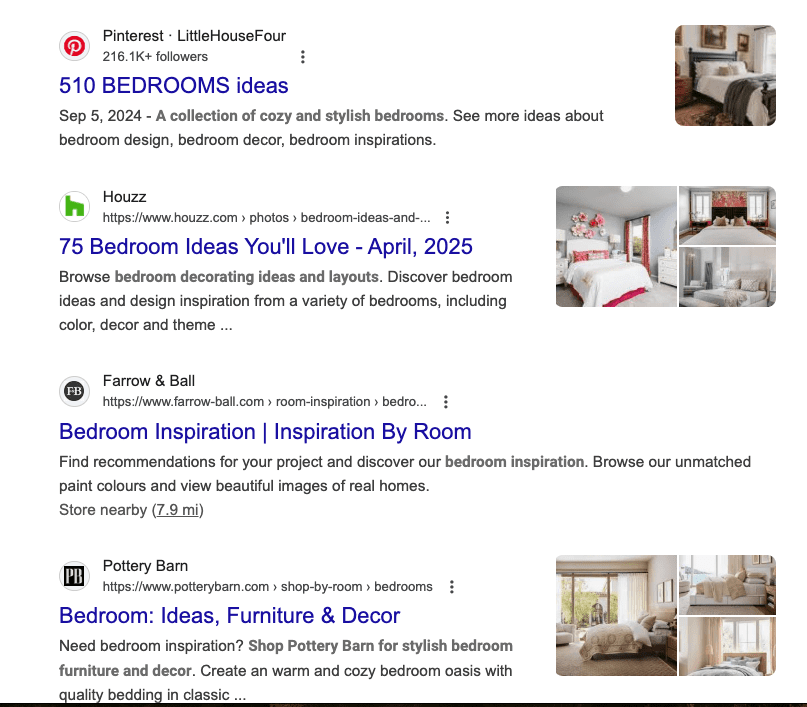
The same search on Pinterest instantly displays bedroom decor ideas, allowing you to quickly identify styles that match your aesthetic preferences without clicking through multiple websites.
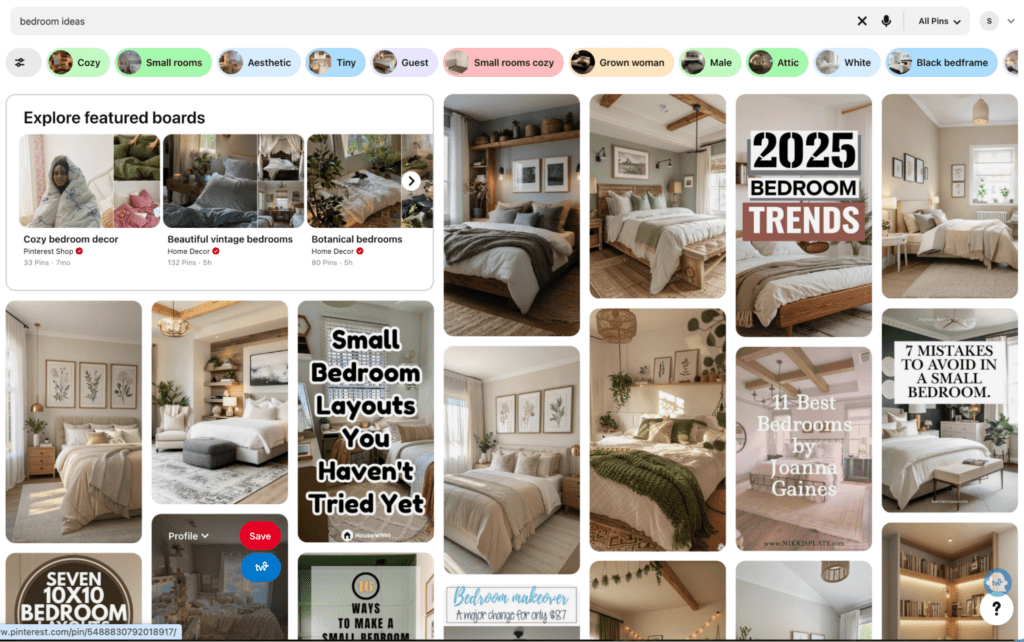
Lens and Visual Search Technology
Pinterest’s visual search technology takes this advantage even further. The Pinterest Lens feature allows users to take photos of real-world objects and find visually similar items on the platform.
This technology is particularly powerful for:
- Fashion: Find similar outfits based on a garment you like
- Home decor: Match furniture pieces to your existing aesthetic
- Art: Discover works with similar styles or color palettes
- DIY projects: Find tutorials for craft ideas you’ve seen elsewhere
While Google has introduced Google Lens, the integration with Pinterest’s extensive visual database and inspiration-focused results makes Pinterest’s version particularly effective for shopping and creative pursuits.
Pinterest’s board feature also gives you a handy way to save the results of your Lens search for easy access later.
Reason #2: Inspiration-Focused Results
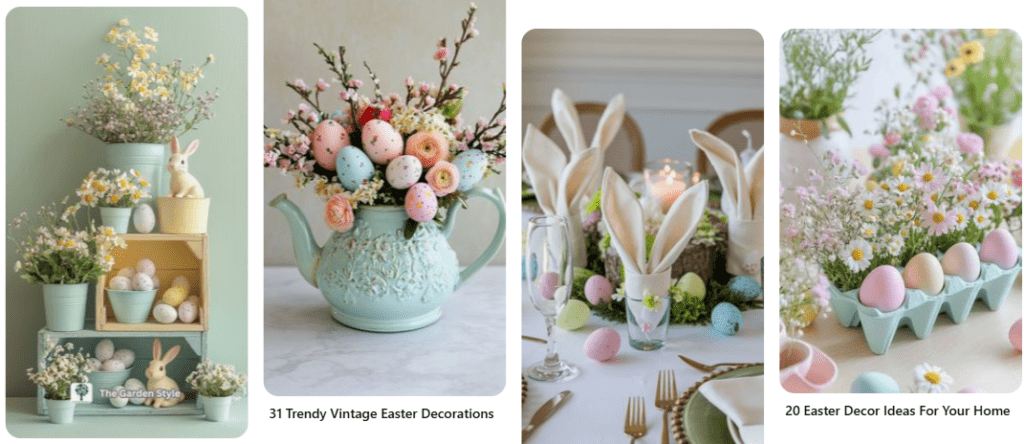
Beyond Informational Intent
Google excels at answering questions and providing information. If you want to know “how to fix a leaky faucet” or “best Mexican restaurants in Chicago,” Google is your go-to search engine.
However, Pinterest shines when search intent is less defined and more inspirational. Many searches don’t have a single correct answer but rather seek ideas, concepts, or possibilities. Pinterest’s algorithm is specifically tuned to understand and serve this type of aspirational query.
Searches like “living room ideas,” “summer outfit inspiration,” or “creative packaging design” are fundamentally about discovering possibilities rather than finding specific information. Pinterest’s entire ecosystem is built around this inspirational intent, delivering results that spark creativity rather than just answering questions.
Curated Discovery Experience
Pinterest’s results benefit from human curation that Google typically lacks. Content on Pinterest is organized into boards by users who manually select and categorize Pins based on their relevance to specific themes.
This human touch creates natural content clusters that enhance the discovery experience. When you find a Pin you like, you can see the board it belongs to, potentially discovering dozens of related ideas that you wouldn’t have thought to search for directly.
This serendipitous discovery rarely happens on Google, where results are primarily driven by algorithmic matching rather than human-curated collections.
Reason #3: Superior Product Discovery Experience

Shopping Discovery Engine
While Google Shopping focuses on helping users find specific products they already know they want to buy, Pinterest excels at introducing users to products they didn’t know existed but align perfectly with their taste.
Pinterest’s shopping features, including Rich Pins and Shop the Look, create a seamless path from inspiration to purchase. The platform’s visual nature makes it particularly effective for products where aesthetics matter:
- Fashion and accessories
- Home decor and furniture
- Art and craft supplies
- Beauty products
- Specialty food items
From Inspiration to Purchase
Pinterest users typically begin their shopping journey much earlier than Google users. According to Pinterest’s research, 97% of searches on the platform are unbranded, meaning users are looking for ideas rather than specific products or companies.
What’s the difference between a branded and non-branded search?
Branded search includes the name of a specific brand with the query. Non-branded search doesn’t specify the brand – which makes it easier for people to find products from brands unknown to them.
Here’s an example:
Branded: Adidas running shoes
Non-branded: running shoes
This early-stage discovery gives brands a unique opportunity to influence purchase decisions before consumers have finalized what they want to buy. By the time someone searches for a specific product on Google, they’ve often already narrowed their options considerably.
The platform’s ability to capture users at the beginning of their purchase journey creates a longer attribution window but often results in higher average order values and customer lifetime value.
Reason #4: Longer Content Lifespan
The Evergreen Nature of Pins
One of the most significant advantages of Pinterest over Google is the longevity of content. While a typical blog post might see its Google traffic peak within weeks of publishing before declining, Pinterest content often builds momentum over months and continues to perform for years.
This extended content lifespan stems from Pinterest’s discovery model, which isn’t exclusively chronological or recency-focused. Unlike social media platforms where content quickly disappears from feeds, Pins continue to surface in search results and related Pin suggestions long after publication.
We’ve analyzed thousands of Pinterest accounts at Tailwind and found that the average high-performing Pin continues to generate engagement for 3-6 months, with many continuing to drive traffic years after initial posting. This contrasts sharply with Google’s increasing preference for fresh content in many categories.
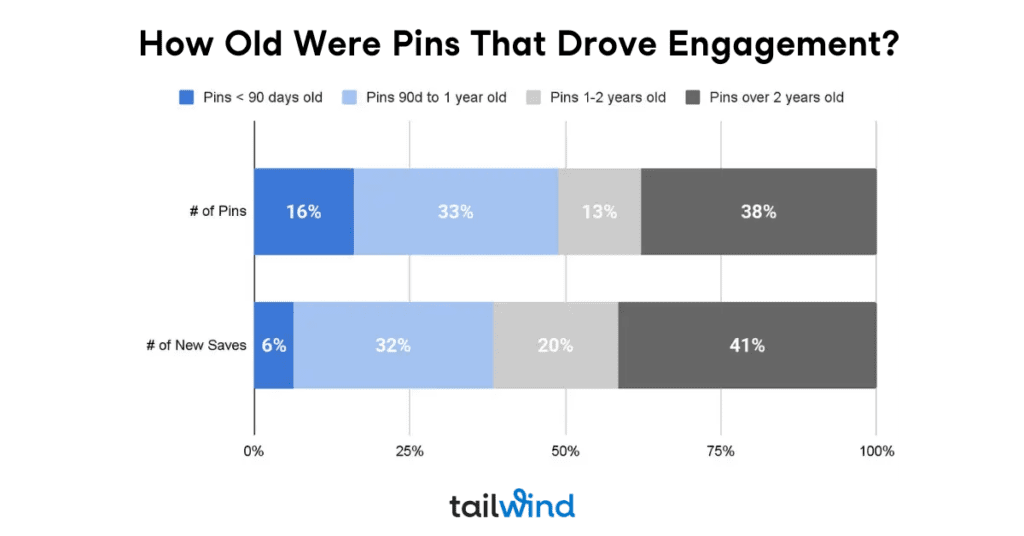
Compound Interest Effect
Pinterest content often demonstrates what we call the “compound interest effect”: Pins that perform well initially get saved to more boards, which increases their distribution, leading to more engagement, and so on.
This virtuous cycle means that content investments on Pinterest can continue to pay dividends long after publication, creating a more sustainable content marketing approach compared to the constant production often required to maintain Google rankings.
For businesses with limited content resources, Pinterest often delivers more long-term value per piece of content created than Google-focused content strategies.
Reason #5: Better for Trend Prediction

Early Trend Indicators
Pinterest has established itself as a leading indicator of consumer trends, with users often searching for and saving ideas months before they become mainstream. The platform’s “Pinterest Predicts” annual report has proven remarkably accurate at forecasting emerging trends across home, fashion, beauty, and food categories.
This predictive capability stems from Pinterest’s position at the beginning of the consumer journey. People use the platform to plan future purchases and projects, creating a window into upcoming consumer behavior that isn’t visible on Google until those trends are already established.
Seasonal Planning Advantages
Pinterest users begin searching for seasonal content significantly earlier than Google users. Holiday planning, seasonal decor, and event preparation searches typically appear on Pinterest 2-3 months before they spike on Google.
This extended planning window gives businesses crucial extra time to:
- Identify emerging seasonal trends
- Develop relevant products and content
- Position inventory and marketing ahead of demand curves
- Capture early-stage purchasers before competitors
For retailers and seasonal businesses, this head start can be the difference between leading or following market trends.
Reason #6: Enhanced User Intent Understanding
The Psychology of Visual Search
Pinterest has developed sophisticated capabilities for understanding visual preferences and aspirational intent that go beyond keyword matching. The platform’s algorithm recognizes that searches for “minimalist living room” aren’t just about finding rooms with few objects but understanding a specific aesthetic and design philosophy.
This visual intelligence allows Pinterest to serve results that match not just the literal search terms but the feeling or mood the searcher is trying to achieve. Google, despite its advances in image recognition, still primarily relies on text signals to understand search intent.
Pinterest’s understanding of visual affinity enables a level of personalization that would be difficult to achieve with text alone. The platform learns your aesthetic preferences over time, further refining the discovery experience in a way that’s particularly valuable for style-driven decisions.
From Vague Ideas to Specific Discoveries
Many searches begin with vague concepts rather than specific terms. Pinterest’s guided search experience excels at helping users refine these ambiguous queries into concrete discoveries.
When you search for a broad term like “kitchen ideas,” Pinterest immediately suggests relevant qualifiers like “small,” “modern,” “farmhouse,” or “on a budget.” This guided approach helps users narrow their search even when they don’t have the vocabulary to articulate exactly what they’re looking for.
Google requires users to know what to search for, while Pinterest helps users discover what they might want through a more exploratory process. This distinction makes Pinterest particularly valuable for novices in a category who don’t yet know the terminology or options available.
Reason #7: Superior for Creative Industries
Design and Creative Professional Benefits
For creative professionals, Pinterest functions as both a search engine and a valuable work tool. Interior designers, fashion stylists, wedding planners, graphic designers, and other visual professionals often use Pinterest as their primary research platform.
The ability to create mood boards, organize visual concepts, and share inspirational collections with clients makes Pinterest an integral part of many creative workflows. While Google remains essential for technical information, Pinterest better serves the conceptual and aesthetic aspects of creative work.
Many design professionals report that Pinterest has replaced traditional methods like tearing pages from magazines or creating physical mood boards, streamlining their research process and improving client communication.
Moodboarding and Conceptual Search
Perhaps Pinterest’s greatest strength is its ability to facilitate searches based on feelings, moods, and abstract concepts rather than just concrete terms. You can search for “calm space,” “cozy vibes,” or “edgy fashion” and receive visually coherent results that capture these subjective qualities.
Google struggles with these conceptual searches because they’re difficult to define textually and are highly subjective. Pinterest’s visual approach and understanding of aesthetic relationships allow it to serve results for searches that would be nearly impossible to satisfy through traditional search engines.
This capability is particularly valuable for searches related to:
- Interior design aesthetics
- Fashion styles and vibes
- Graphic design moods and tones
- Event themes and atmospheres
- Art styles and inspirations
Pinterest vs Google Search: What Marketers Need to Know
1. Search Intent: Answers vs Inspiration
- Google Search: People usually search with a problem in mind: “best budget laptop 2025” or “symptoms of dehydration.” They’re looking for direct answers, solutions, or product comparisons.
- Pinterest Search: People are more open-ended. A user might type “cozy fall living room” or “healthy dinner recipes.” They’re not looking for one definitive answer; they’re exploring, saving, and building ideas.
Why it matters for marketers:
- Optimize Google content for direct answers and keywords tied to urgent needs.
- Optimize Pinterest content for inspiration, lifestyle, and visual storytelling.
2. Visual vs Text-First
Google’s results pages are text-heavy with snippets, links, and — increasingly — AI overviews. Yes, it includes images and shopping results, but the experience is still search-query → text-based answer.
Pinterest is visual-first. Search results appear as grids of Pins with titles, images, and sometimes shoppable links. On Pinterest, the image is the click magnet.
For marketers: invest in eye-catching visuals and multiple design variations. A keyword-rich description will help rank, but a compelling image gets the click.
3. Algorithm Differences
Google: Prioritizes domain authority, backlinks, Core Web Vitals, content relevance, and freshness.
Pinterest:
- Prioritizes keyword alignment (titles, descriptions, boards)
- Looks at engagement signals—saves, clicks, shares
- Loves Fresh Pins: unique new designs, not recycled versions
Takeaway: Google rewards authority and depth; Pinterest rewards freshness and engagement.
4. Content Lifespan
One of Pinterest’s biggest advantages is longevity.
- Google: Rankings can change quickly. Once competitors outrank you, traffic drops.
- Pinterest: A single Pin can drive traffic for months or even years.
In fact, research shows Pinterest content has a 3.5x longer lifespan than posts on Instagram or TikTok (Tailwind 2025 Benchmark Study, Part 1).
5. User Behavior Differences
- Google users: typically visit one page, grab their answer, and leave.
- Pinterest users: save multiple Pins, revisit boards, and explore clusters of related content.
Pinterest drives a “sticky” user experience. People don’t just click—they curate.
Marketing opportunity: Design Pins that encourage saving. Even if a user doesn’t click through immediately, a save means you’ve earned ongoing visibility in their board and potentially their followers’ feeds.
6. Shopping & Commerce Angle
Pinterest is increasingly a shopping discovery engine. Over 80% of weekly Pinners say they’ve discovered a new brand or product on Pinterest (Pinterest Business).
Meanwhile, Google dominates product comparison and purchase intent searches (“best noise-cancelling headphones 2025”).
How to use both together:
- Pinterest = inspire with lifestyle content (“cozy winter outfit ideas”).
- Google = capture direct buyer intent (“best wool sweater brands”).
7. SEO Strategy Overlap
There are overlaps. Both Google and Pinterest require keyword research, trend awareness, and consistent publishing. But the execution differs:
- Google SEO = long-form, in-depth, link-worthy content.
- Pinterest SEO = keyword-rich descriptions + optimized visuals + Fresh Pins.
Related Reading: Pinterest Keywords: The Ultimate Guide
Practical Takeaways for Marketers
- Think of Pinterest as top/mid-funnel: reach people early in their journey with inspirational visuals.
- Think of Google as mid/bottom-funnel: capture people who are actively comparing or ready to buy.
- Repurpose your blog posts and product pages into Fresh Pins to get both SEO and discovery traffic. Tailwind SmartPin makes this super simple: enter a URL, get a 100% unique Pin made for you every week.
- Use Tailwind SmartPin to automate new Pin designs and descriptions each week, keeping content fresh without hours of manual work.
When to Use Pinterest vs. Google Search
Best Use Cases for Each Platform
While we’ve highlighted Pinterest’s advantages for visual discovery, Google remains superior for many search needs. The ideal approach is understanding when to use each platform:
Pinterest excels at:
- Visual inspiration and idea generation
- Aesthetic and style exploration
- Early-stage purchase research
- Creative concept development
- Lifestyle and aspirational content
- Planning and project preparation
Google remains superior for:
- Factual information and answers
- Local business discovery
- Technical specifications and reviews
- News and current events
- Navigational searches (finding specific websites)
Integrated Search Marketing Strategy
Smart marketers don’t choose between Pinterest search and Google search but develop strategies that leverage both platforms’ strengths. A comprehensive approach might include:
- Using Pinterest to identify emerging trends in your industry
- Creating visual assets optimized for Pinterest discovery
- Developing in-depth content around these topics for Google search
- Cross-promoting Pinterest boards on your website to enhance Google content
- Monitoring performance metrics across both platforms to identify opportunities
By understanding each platform’s unique advantages, you can create content that performs well across both ecosystems while allocating resources to the channels most relevant to your specific business and audience.
Ready to elevate your Pinterest marketing strategy? Tailwind’s scheduling, analytics, and optimization tools make it easy to maximize your Pinterest search visibility while saving time. Start your free trial today and discover why thousands of businesses trust Tailwind to grow their presence on visual search platforms.
